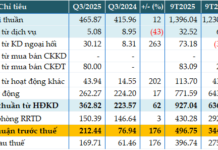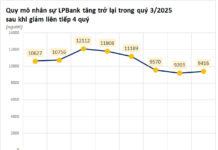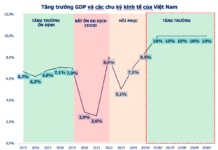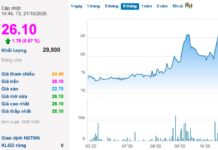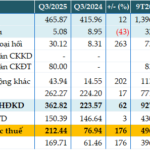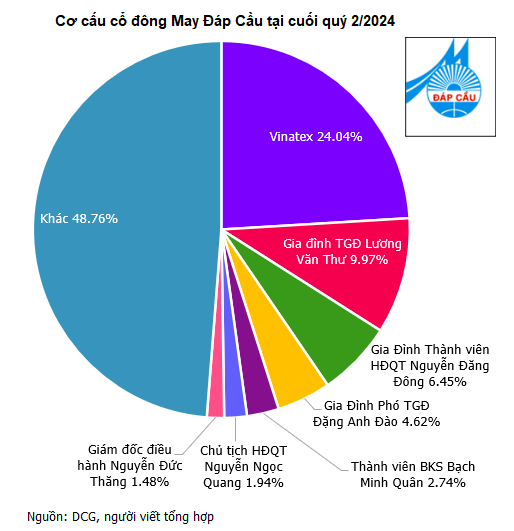On July 9, Ms. Ly Kim Chi, Chairman of the Ho Chi Minh City Foodstuffs Association (FFA), told Nguoi Lao Dong reporters that the association is working with food production enterprises to urgently organize a workshop to petition the Ministry of Health to remove the regulation on adding iodized salt, iron, and zinc to food products from Decree No. 09/2016/ND-CP.
Is the Ministry of Health turning a blind eye?
Earlier, in early July 2024, FFA, together with four related industry associations, including the Transparent Food Association, the Ho Chi Minh City Foodstuffs Association, the Vietnam Association of Seafood Exporters and Producers, the Vietnam High-Quality Goods Enterprises Association, and the Phu Quoc Fish Sauce Association, sent a document to Deputy Prime Minister Le Thanh Long, the Government Office, and the Ministry of Health expressing their expectations for amendments to Decree No. 09/2016/ND-CP (Decree 09) and the progress of those amendments.
In the proposal, the five industry associations stated that for the past seven years, the food industry associations, in the spirit of contributing to the safety of the people and the sustainable development of the food economy, have sent many documents and proposals to the Prime Minister, the Government, the Ministry of Health, and related ministries and branches regarding an important content in Decree No. 09.

According to regulations, salt used in the production of instant noodles and fish sauce, among other things, “must be iodized.” Photo: THANH NHAN
Specifically, the regulations in points a and b of Clause 1, Article 6 of Decree 09: “Salt used in food processing must be iodized” and “Wheat flour used in food processing must be fortified with iron and zinc.” The food industry associations provided a series of evidence showing that these regulations are inappropriate, contrary to the risk management principle, lacking scientific basis, and inaccurate regarding the World Health Organization’s guidelines, international practices, and export-oriented food production industries. In particular, they cause costs and difficulties for food production and business without providing significant health benefits to the community.
On May 15, 2018, the Government issued Resolution No. 19-2018/NQ-CP (Resolution 19) and directed the Ministry of Health to “Study and amend and supplement Decree 09 towards: abolishing the regulation that ‘salt used in food processing must be iodized’ and abolishing the regulation that ‘wheat flour used in food processing must be fortified with iron and zinc.’ Instead, only encourage food processing enterprises to use them.”
Ms. Ly Kim Chi said that on June 26, 2018, the Ministry of Health issued Plan No. 618 to amend Decree 09, but this plan has not been implemented to date. The Ministry of Health has only consulted on the draft amendment to Decree No. 09 so far. However, this draft does not mention amending the regulations in points a and b of Clause 1, Article 6 of Decree 09. “Is the Ministry of Health ignoring the Government’s directive and not abolishing the regulations on the mandatory use of iodized salt and iron and zinc-fortified wheat flour in food processing?” Ms. Chi expressed her concern.
Enterprises are struggling
The Chairman of FFA added that since the COVID-19 pandemic, the food industry has faced numerous difficulties, and many enterprises have even lost their chance of recovery, having to sell or shut down and withdraw from the market. The prolonged challenges, along with losses due to compliance with inappropriate and impractical regulations and procedures, have been affecting the trust of enterprises.
A representative of a traditional fish sauce production enterprise in Ho Chi Minh City said that their product already contains a significant amount of natural iodine from salt and fish. When the regulation on the use of iodized salt in food processing was implemented, the enterprise produced a trial batch, but the result was that the fish sauce did not meet the sensory requirements, and the color turned black. Meanwhile, the use of iodized salt increased costs, but the final product did not show any difference in iodine content compared to using regular salt. “We also export our products to Japan and Europe, so when using iodized salt, we have to explain and justify, which creates obstacles in the export process,” said the enterprise owner.
According to this enterprise owner, it is not advisable to force food processing enterprises to use iodized salt and iron and zinc-fortified wheat flour because it creates difficulties for enterprises and may not be beneficial to consumers. “A lack of micronutrients like iodine, iron, and zinc is not good, but an excess is also not beneficial. Therefore, it is better to encourage application and require enterprises to clearly state it on the packaging for consumer information and choice,” proposed the owner of this fish sauce company.
According to Ms. Ly Kim Chi, after Decree 09 came into being, enterprises in the food production and processing industry have “cried for help” directly or through documents. Enterprises have researched, experimented, and provided evidence that adding iodized salt can cause reactions (due to its strong oxidizing nature) and lead to changes in smell, taste, and color, affecting the quality of products such as seafood, dried fruits and vegetables, poultry meat, cereals; various seasoning powders, premixes for making sweets and used in the processing of various foods; ready-to-eat products, etc.
For traditional fish sauce production, the requirement to add iodine only increases costs and alters the natural color and taste of fish sauce because seawater fish are already rich in iodine.
Notably, some major export markets do not accept food with added iodine, and enterprises must obtain certification of non-use of iodized salt to export to these markets, such as Japan, where enterprises incur additional costs to adjust their production processes accordingly.
Similar negative impacts are also observed when implementing the regulation on “wheat flour used in food processing must be fortified with iron and zinc.” Vietnam is importing large quantities of wheat flour from other countries, while the exporting countries do not have regulations on adding iron and zinc to wheat flour.
Consumers may not benefit
According to Dr. Nguyen Thi Hong Minh, Chairman of the Transparent Food Association (AFT), the business community has long been frustrated with these regulations. Many enterprises reflected that adding micronutrients to food affects product quality and increases costs, while consumers may not benefit. However, instead of issuing new regulations in the spirit of Resolution No. 19-2018/NQ-CP of the Government to “encourage enterprises to apply” these additions, the consulting agency is conducting another survey of food enterprises with the orientation of keeping the original regulations.
Optimistic but Challenging Journey for a Startup Business
Operating in factories of multiple businesses with an optimistic start as workers return to bustling work after the Lunar New Year holiday. Production orders for the first few months have increased compared to the same period last year, but businesses are facing increasingly greater challenges ahead.
“Successful 3Sach Supermarket Chain Raises Capital from Japan’s Yaoko Group.”
The partnership with the Yaoko Group marks a significant step forward in the growth strategy of 3Sach, Vietnam’s pioneering farm-to-table clean food provider.







